Book contents
- Frontmatter
- Contents
- List of contributors
- Foreword
- Section I Basic sciences
- Section II Anaesthesia and peri-operative care for surgical specialties
- Section III At a glance
- Chapter 22 Scoring systems
- Chapter 23 Modes of mechanical ventilation
- Chapter 24 Fluids
- Chapter 25 Coagulation
- Chapter 26 Pre-operative echocardiography
- Chapter 27 Common drugs and doses
- Chapter 28 Physiology and risk in special circumstances
- Chapter 29 Medicolegal aspects of consent
- Chapter 30 Nerve injury
- Chapter 31 Pre-operative investigations
- Chapter 32 Enhanced recovery
- Chapter 33 Post-operative cognitive dysfunction
- List of abbreviations
- Index
- References
Chapter 33 - Post-operative cognitive dysfunction
Published online by Cambridge University Press: 05 July 2014
- Frontmatter
- Contents
- List of contributors
- Foreword
- Section I Basic sciences
- Section II Anaesthesia and peri-operative care for surgical specialties
- Section III At a glance
- Chapter 22 Scoring systems
- Chapter 23 Modes of mechanical ventilation
- Chapter 24 Fluids
- Chapter 25 Coagulation
- Chapter 26 Pre-operative echocardiography
- Chapter 27 Common drugs and doses
- Chapter 28 Physiology and risk in special circumstances
- Chapter 29 Medicolegal aspects of consent
- Chapter 30 Nerve injury
- Chapter 31 Pre-operative investigations
- Chapter 32 Enhanced recovery
- Chapter 33 Post-operative cognitive dysfunction
- List of abbreviations
- Index
- References
Summary
Introduction
Advances in peri-operative care over the past several decades have resulted in a significant reduction in patient mortality and morbidity. This has contributed to an increasing focus on sometimes subtle changes in cognition that are associated with surgery, especially in the elderly. These changes can be transient or permanent, or can also modify the course of long-standing cognitive decline. Although more common, or more pronounced in the elderly, such cognitive impairment is not uncommon in all age groups. When persistent, cognitive decline after surgery can lead to an increased risk of disability and mortality, which can result in loss of employment or independence, and reduction in quality of life. An increasingly aged population also means that such cognitive impairments can have a significant societal impact too.
Types of cognitive disturbances following surgery
Post-operative cognitive impairment can be either because of exacerbation of a previously existing condition, or new-onset. It is clinically important to distinguish between the various types of new-onset impairment, as the time course of each condition is different. Delirium is probably the most common cause of such deterioration, occurring either in the immediate post-operative period (emergence delirium) or a few days later. This is distinct from the condition called post-operative cognitive dysfunction (POCD), defined on the basis of a cognitive test battery performed before and at several times after anaesthesia and surgery. Early POCD, i.e. impairment of cognition around seven days post-operatively, must be distinguished from late POCD, which is diagnosed at least three months post-operatively. The occurrence of POCD after anaesthesia may also represent the cognitive decline in the elderly (MCI, mild cognitive impairment) that precedes the dementia of Alzheimer’s disease. The main differences between the two conditions are summarised in Table 33.1.
- Type
- Chapter
- Information
- A Surgeon's Guide to Anaesthesia and Peri-operative Care , pp. 312 - 316Publisher: Cambridge University PressPrint publication year: 2014

